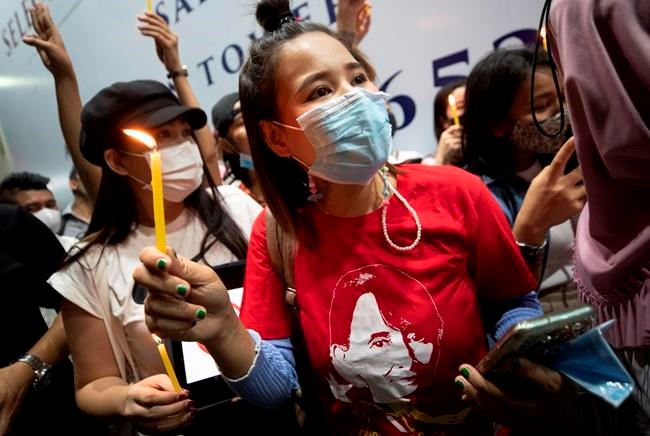CAMEROON, Cameroon — The U.N. Security Council strongly backed a return to democracy in Myanmar on Thursday and called for the immediate release of Aung San Suu Kyi and all those arbitrarily detained by the military.
In its first statement on the military’s ouster of the government, the U.N.’s most powerful body “stressed the need to uphold democratic institutions and processes, refrain from violence, and fully respect human rights, fundamental freedoms and the rule of law.”
“The members of the Security Council emphasized the need for the continued support of the democratic transition in Myanmar,” the council said in the statement, which referred to the military's imposition of a state of emergency without calling it a coup.
The council's 15 members encouraged “dialogue and reconciliation in accordance with the will and interests of the people of Myanmar.”
In addition to calling for the immediate release of State Counsellor Suu Kyi and President Win Myint, the council expressed concern “at the restrictions on civil society, journalists and media workers.”
The statement was issued two days after the council held an emergency meeting behind closed doors to discuss the military’s seizure of power on the eve of the first meeting of the country’s new Parliament.
The military said it was necessary because the government had not acted on its unsubstantiated claims of fraud in November’s election in which Suu Kyi’s party swept the vote and the military did poorly. Suu Kyi has since been charged with possessing illegally imported walkie-talkies, which carries a maximum three-year sentence, according to her party.
Britain's U.N. Ambassador Barbara Woodward, the current council president who spearheaded the statement, welcomed its unanimous approval saying “it is important that we speak with one voice on the need for Myanmar to restore its democratic processes and release those detained."
U.N. spokesman Stephane Dujarric also said the statement's relatively quick adoption is very welcome and “sends a very strong signal” of international support for a restoration of moves toward democracy.
At Tuesday’s meeting, Christine Schraner Burgener, the U.N. envoy for Myanmar, urged the council to ensure that “democracy is expeditiously restored” to the Southeast Asian nation. The council took no immediate action because China, a close
The council statement issued Thursday reiterated strong support to the Association of Southeast Asian Nations, known as ASEAN, and welcomed a statement by its chair.
Brunei, which chairs the 10-nation regional group, including Myanmar, issued a statement Monday noting the bloc’s principles include “the adherence to the principles of democracy, the rule of law and good governance, respect for and protection of human rights and fundamental freedoms.”
The statement encouraged “the pursuance of dialogue, reconciliation and the return to normalcy in accordance with the will and interests of the people of Myanmar.”
It made no mention of any action by ASEAN to take the lead in returning Myanmar to a democratic path.
In his strongest reaction to the military’s takeover, U.N. Secretary-General Antonio Guterres called Wednesday for international pressure to restore democracy to Myanmar.
“We will do everything we can to mobilize all the key actors of the international community to put enough pressure on Myanmar to make sure that this coup fails,” the U.N. chief said in an interview on Washington Post Live.
Dujarric, the U.N. spokesman, said Thursday that Guterres and U.N. envoy Schraner Burgener “will continue their contacts and efforts to reach people who can help move the situation forward in a positive manner.”
He stressed that the U.N. is also concerned about “the situation of all people in Myanmar, the human rights situation, the lack of freedom of expression, the shutting down of some Internet platforms."
Guterres said in the interview that Suu Kyi has defended the military, including for its offensive against the Rohingya Muslims in northern Rakhine state, “so it’s absolutely unacceptable to see this coup.” He called for the release of all detainees, a return to
The Security Council statement also mentioned the plight of the Rohingyas and alluded to a November 2017 presidential statement condemning widespread violence in Rakhine and expressing grave concern at reported human rights violations by Myanmar’s security forces against minority Rohingya Muslims. It called on the government to ensure “no further excessive use of military force.”
A counterinsurgency operation by Myanmar’s military in 2017 involving mass rape, murders and the torching of villages drove more than 700,000 Rohingya Muslims into
The Security Council on Thursday reiterated the need “to address the root causes of the crisis in Rakhine State and to create conditions necessary for the safe, voluntary, sustainable, and dignified return of displaced persons.”
Edith M. Lederer, The Associated Press



